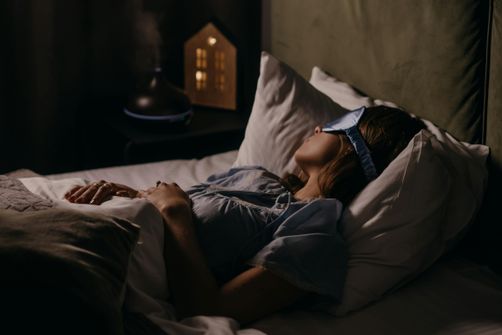
How CBT-I Helps Women Manage Insomnia: Boosting Sleep Quality and Overcoming Sleep Disorders
Sleep is essential for physical and mental well-being, but many women struggle with sleep disorders like insomnia, which can lead to fatigue, irritabi...

Sleep is a biological need, but how different cultures approach it reveals much about health, balance, and well-being. From siestas in Mediterranean cultures to co-sleeping in parts of Asia and Africa, these time-honored practices offer valuable insights into sleep and stress management—particularly for modern women.
As we explore these cultural sleep traditions, we’ll also uncover evidence-based benefits and practical ways to incorporate them into a contemporary lifestyle.

The siesta, a brief afternoon nap traditionally practiced in Spain, Italy, and other Mediterranean regions, is rooted in the practical need to rest during the hottest part of the day. But beyond its cultural origins, there is robust scientific support for napping as a way to boost energy, mood, and cognitive function.
How to Incorporate: If you experience an energy dip in the afternoon, a brief nap of 20-30 minutes can refresh you without disrupting nighttime sleep. Set an alarm to ensure you don’t oversleep, and find a quiet, comfortable space to relax.
In many cultures, co-sleeping—sharing a bed or room with family members—is common. While this practice is often debated in Western societies, research suggests it can promote a sense of security, emotional bonding, and better sleep quality, particularly for women.
Consider This: If co-sleeping is a new idea for you, try starting with shared spaces where everyone has enough room to be comfortable. Setting boundaries around sleep space and routines can help ensure that everyone gets enough rest.
In many traditional cultures, sleep is segmented into multiple periods—known as polyphasic sleep—rather than one long stretch at night. This practice can be particularly useful for women managing hectic schedules or multiple responsibilities.
Try This: If getting a full 7-8 hours of sleep in one block is difficult, experiment with short naps or sleep intervals during the day. This can help maintain energy levels and prevent the cognitive decline associated with sleep deprivation.
In agrarian societies, waking early with the sunrise has long been a part of daily life. Many cultures emphasize the importance of starting the day with the natural light, which aligns with the body’s circadian rhythms.
Give It a Go: Gradually adjust your wake-up time by 15 minutes earlier each day, and make a habit of getting exposure to morning sunlight. A morning walk or stretch outside can help reinforce your natural sleep-wake cycle and set you up for a more productive day.

In some parts of Africa and Latin America, collective rest—where communities or families rest together—plays an important role in promoting relaxation and emotional well-being. This tradition of communal rest reinforces social bonds and offers psychological benefits.
How to Include This: Consider ways to build connection into your relaxation routine, whether it’s sharing quiet time with your partner or family, or organizing a community nap or meditation session. Emotional support and bonding can enhance relaxation and sleep quality.
Q: What is a siesta, and how can it help improve sleep quality?
A: A siesta is a short nap taken in the afternoon, common in Mediterranean cultures. Research shows that a brief 20-30 minute nap can improve cognitive function, mood, and energy levels without affecting nighttime sleep. For modern women, a siesta can be a great way to recharge during the day, especially when managing work and family stress.
Q: How does co-sleeping affect sleep quality?
A: Co-sleeping, practiced in many Asian, African, and Latin American cultures, can promote a sense of security and emotional bonding. Studies suggest that co-sleeping may reduce nighttime anxiety and enhance sleep quality for women, particularly those experiencing stress. However, it’s important to establish healthy sleep boundaries to ensure restful sleep for everyone involved.
Q: What is polyphasic sleep, and who benefits from it?
A: Polyphasic sleep involves dividing sleep into multiple shorter periods throughout the day, rather than sleeping in one long stretch. It’s a flexible sleep schedule that can be beneficial for women with erratic routines, such as shift workers or caregivers. Research shows that polyphasic sleep can reduce fatigue and improve cognitive function.
Q: How does waking up early align with natural circadian rhythms?
A: Waking up early, as practiced in many agrarian societies, aligns with the body’s circadian rhythm, which regulates sleep-wake cycles. Exposure to morning sunlight helps regulate melatonin and serotonin, improving mood and sleep quality. For women struggling with sleep disturbances or hormonal changes, this practice can help reset the body’s natural rhythm.
Q: How can collective rest promote emotional well-being?
A: In some cultures, collective rest—such as napping together or relaxing as a community—fosters a sense of belonging and emotional support. Studies show that this social connection can reduce stress and improve mental health, which may contribute to better sleep quality.
This article is for informational purposes only and is not a substitute for professional medical advice, diagnosis, or treatment. Always consult a healthcare professional regarding sleep disorders, chronic stress, or before adopting new sleep practices, especially if you have specific health conditions. The effectiveness of sleep practices can vary, and results may differ from person to person based on individual needs and circumstances.
Cultural sleep practices like siestas, co-sleeping, polyphasic sleep, and early rising offer time-tested solutions to modern sleep challenges. For women today, these traditions provide practical strategies to improve sleep quality, reduce stress, and support overall well-being. By adapting these practices into your daily routine, you can enhance your sleep and take a more holistic approach to rest and recovery.
Ultimately, improving sleep isn’t just about the number of hours you spend in bed—it’s about creating a balanced routine that aligns with your body’s needs and your lifestyle. With a little inspiration from cultural traditions, women can find new ways to rest, recharge, and thrive.

Sleep is essential for physical and mental well-being, but many women struggle with sleep disorders like insomnia, which can lead to fatigue, irritabi...

Friendship isn't just about shared laughs, deep conversations, and happy memories—it's also about longevity. Female friendships play a crucial role in...

Liminal spaces, or transitional periods in life, represent moments of transformation where women are “in between”—neither in the old nor the new, but ...

Laughter is a powerful tool for improving both mental and physical health, especially for women. The act of laughing releases a cascade of positive ph...

Creative Expression, whether through art, music, writing, or other pursuits, is not just a source of joy and self-expression—it has profound impacts o...